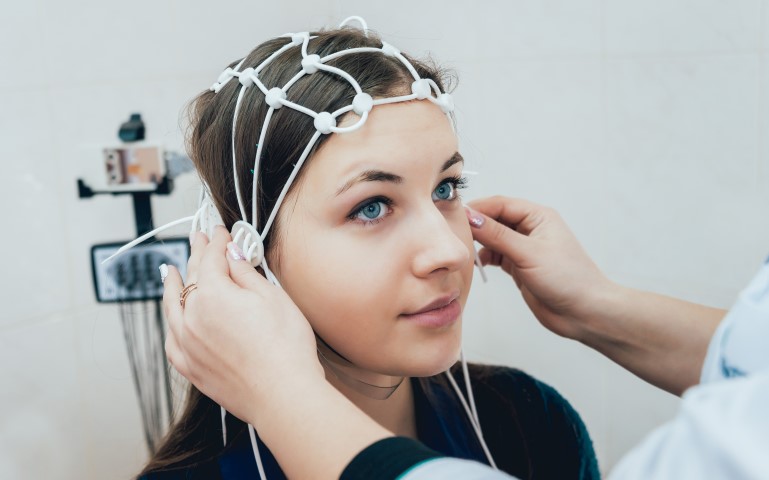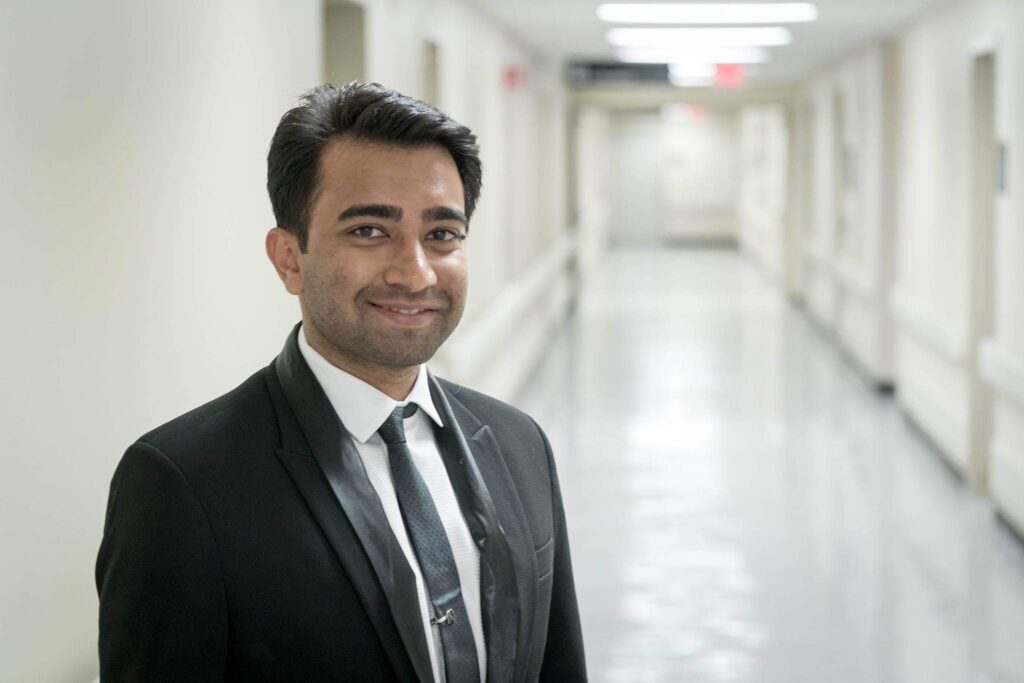An electroencephalography (EEG) is a diagnostic test that detects abnormalities and variances in your brain waves, or in the electrical activity of your brain. During the procedure, a technician will affix electrodes consisting of small metal discs with thin wires onto your scalp. These electrodes can then detect tiny electrical charges that result from the activity of your brain cells. This procedure is non-invasive. EEG may aid in the diagnosis of seizures/epilepsy, sleep disorders, head injuries, encephalopathies and dementias, as well as brain tumors.
You can contact Dr. Hashwani for an evaluation by calling 281-313-0337.

Electroencephalogram (EEG) in Sugar Land: Quality Diagnostic Services at HNNC
Understanding the Importance of Electroencephalogram (EEG)
An electroencephalography (EEG) is more than just a diagnostic test; it is a vital tool for pinpointing abnormalities and variances in your brain waves or in the electrical activity of your brain. At EEG test centers in Sugar Land, like HNNC, we are equipped to guide you through this process, helping to identify potential issues affecting your brain health.
What is Electroencephalogram (EEG)?
An EEG is a diagnostic procedure that is conducted by trained electroencephalogram specialists in Sugar Land at HNNC. The process involves a technician affixing electrodes – small metal discs connected with thin wires – onto your scalp. These electrodes are adept at detecting tiny electrical charges stemming from the activity of your brain cells. This non-invasive procedure is vital in understanding the intricate patterns and activities of the brain.
The Process of EEG
During the EEG procedure at HNNC, your brain’s electrical signals are captured and recorded on a computer. This EEG brain wave test in Sugar Land is a comprehensive way to map out the various functionalities and activities occurring within your brain, aiding in the diagnosis of several conditions.

Why Choose EEG at HNNC?
Choosing to undergo your EEG at HNNC means entrusting your care to a team that prioritizes precision and quality. Our dedicated team at our clinic is here to ensure a comfortable and efficient experience.
Conditions Diagnosed with EEG
The EEG serves as a powerful tool in diagnosing a variety of conditions including, but not limited to seizures/epilepsy, sleep disorders, head injuries, encephalopathies, dementias, and even brain tumors.
- Epilepsy Diagnosis Epilepsy, characterized by recurrent seizures, can be effectively diagnosed through an EEG. It helps identify abnormal electrical activities in the brain typically seen during seizures.
- Sleep Disorders EEG is also instrumental in diagnosing sleep disorders, assisting in the analysis of sleep patterns and identifying any disruptions in brain waves affecting sleep quality.
EEG at HNNC
At HNNC, we take pride in offering comprehensive EEG services that prioritize your well-being at every step of the process. Our dedication lies in equipping you with detailed information and guidance, ensuring that you are well-prepared before the test and fully informed after it.
Preparing for an EEG
Before the test, we go the extra mile to help you prepare adequately, setting the stage for the most accurate results. Our expert team will furnish you with clear guidelines that could include necessary steps such as washing your hair to create an optimal environment for the electrode placement and advising on the consumption of certain foods or medications that might interfere with the readings. We believe in keeping you informed and comfortable, encouraging open dialogue where you can ask any questions or address concerns about the preparation phase.
After the EEG
Following the procedure, a smooth transition back to your regular activities is what we aim for. You’ll find that our commitment to your well-being continues well after the test has concluded. Dr. Hashwani and our team will take the time to sit down with you and discuss the results in a manner that is easy to understand. Together, we will outline the subsequent steps in your treatment or management plan, ensuring you are actively involved and informed at every juncture. Our focus is to provide a seamless experience that integrates quality care with genuine support, fostering a journey toward health that is collaborative and empowering.
Schedule an EEG Appointment/Evaluation
You can contact Dr. Hashwani for an evaluation by calling 281-313-0337 or by filling out the contact form below:
1. What should I expect during an EEG procedure in Sugar Land?
During an EEG procedure at a Sugar Land clinic, you can expect to be welcomed into a comfortable setting where your wellbeing is the priority. The procedure itself is non-invasive. A technician will attach electrodes, which are small metal discs connected to thin wires, onto your scalp. These electrodes are designed to detect the tiny electrical charges resulting from the activity of your brain cells. Throughout the process, you may be asked to perform certain actions, such as closing your eyes or breathing deeply. The aim is to record your brain waves during various states of activity to provide a comprehensive overview of your brain’s electrical functioning.
2. How long does the EEG procedure take at HNNC?
The EEG procedure at HNNC typically takes about 60 to 90 minutes. This includes time for preparation, such as affixing the electrodes to your scalp, as well as the time spent recording the brain wave activity. It is advised to allocate a little extra time for settling in before the test and for removing the electrodes after the procedure is completed.
3. Can I eat before undergoing an EEG at HNNC?
Yes, you can eat before undergoing an EEG at HNNC. In fact, it is recommended to have a regular meal before your appointment to avoid any discomfort during the procedure. However, it’s advisable to avoid foods and drinks containing caffeine for at least 8 hours before the test, as caffeine can interfere with the results of the EEG.
4. What are the necessary preparations for an EEG test at a Sugar Land EEG clinic?
Preparing for an EEG test at a Sugar Land EEG clinic involves several steps to ensure the accuracy of the test results.
Here are the general guidelines:
- Wash your hair the night before or the morning of the test, avoiding conditioners, hair creams, or sprays that can interfere with the electrodes.
- Take your regular medications unless instructed otherwise by your doctor.
As mentioned, avoid consuming caffeine-containing foods and beverages for at least 8 hours before the test. - Wear comfortable clothing and be prepared to remove any metal objects, such as jewelry or glasses, before the procedure.
- It may be recommended to sleep less the night before if the doctor wishes to record your brain waves while you are sleepy.
Remember, always follow the specific instructions provided by your healthcare provider or the clinic.
- Monday8:30 AM — 4:30 PM
- Tuesday8:30 AM — 4:30 PM
- Wednesday8:30 AM — 4:30 PM
- Thursday8:30 AM — 4:30 PM
- Friday8:30 AM — 1:00 PM
- SaturdayClosed
- SundayClosed
